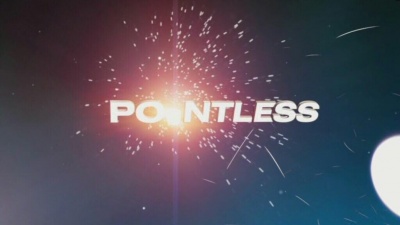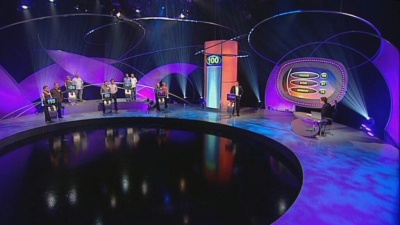Pointless
m (1 revision) |
UKGameshows (Talk | contribs) |
Revision as of 14:00, 22 December 2009
Synopsis
Cross the surveys of Family Fortunes with the inverse scoring of Beat the Nation and you get... well, you get Topranko!, more or less. Or, if you're BBC Two and pitching for the daytime audience, you get this. If it was us, we probably wouldn't tempt fate (and TV critics) by calling it Pointless, though.
So anyway, Endemol (or rather their appointed agents, specifically market research company Redshift Research) has given 100 people, 100 seconds to name as many things as they can in a given category. These categories are fairly varied, although categories relating to countries and their languages, locations, affiliations etc, do seem to appear far more often than any other category. In the studio, the contestants only have to come up with one answer at a time, and (provided it's a valid answer) they will score points, from zero to 100, depending on how many people gave that answer in the survey. The aim is to give the most obscure answers, and thereby receive the lowest score. Ideally, one would give an answer that nobody gave in the survey - a "pointless" answer - thus scoring nothing at all, and incidentally adding £250 to the jackpot (which starts at £1000 and goes up by £1000 each day it remains unwon).
Five pairs start. Each of the first three rounds has the same gameplay: a general category (say, "film" or "politics") is given, to allow each pair to decide which of them will go first in that round. Once the order has been decided, the actual question is given, e.g. "Films directed by Steven Spielberg" or "British Prime Ministers Since 1900". Alexander Armstrong asks the first player in each pair in turn to give an answer fitting that category; a valid answer scores as outlined above, while an invalid answer scores a penalty of 100 points. After the first player from each pair has given an answer, the second player steps forward to give their answer. The player from the pair who gave their answer last in the first section gives their answer first, the player from the pair who gave their answer fourth in the first section answers second and so on, thereby limiting any unfairness resulting from being the last to answer. Once both players in each pair have answered, the pair with the highest score is eliminated, however each pair is allowed to return for a second and final chance on the next day's show. In the event of a tie-break, each pair must provide another answer, over which they can confer. Each round is treated as a separate contest, with the scores starting afresh from zero each time.
After three rounds, the two surviving pairs play the "head to head" round; the scoring is as before, but now conferring is allowed and encouraged. Also the pair who scored lower over the previous three rounds gets to choose one of two categories. (They also get to choose whether to go first or second, though it seems unlikely that a few seconds' extra thinking time would make up for the disadvantage of always having second "pick", so anyone with their wits about them will choose to go first.) The pairs get an equal number of turns, and the round ends when one or both pairs go over 100 points. The higher-scoring team is eliminated and the other wins the "stunning" Pointless trophy.
The winning team also gets to go for the cash jackpot, which entails picking one of three categories and then giving a Pointless answer to whatever the question is. They are given up to one minute to come up with three answers, however they only need one of them to be Pointless to win the jackpot, but even so it's a very difficult endgame and is rarely won. Oddly, whereas the pairs eliminated earlier in the game can return for second try the next day, the pair who reach the final are not allowed to return the next day, regardless of whether they win or not, and immaterial of whether it is their first time on the show.
Catchphrases
"You just didn't have that pointless [subject] knowledge"
(When demonstrating the wrong answer graphics) "You really don't want to see that..."
"It's good! It's very good!"
Trivia
During the first series, "Central African Republic" appeared as a pointless answer to four separate questions: "Countries beginning with C", "African countries", "French-speaking countries" and "national flags with stars on". And just to rub it in, its capital Bangui was a pointless answer to "Capital cities beginning with B".
Music
Marc Sylvan



